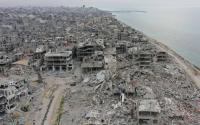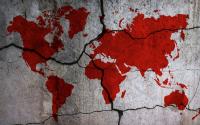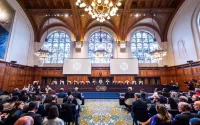Fernand Braudel Center, Binghamton UniversityList of previous commentaries in English and translations in other languagesCommentary No. 176, Jan. 1, 2006
Whatever one thinks of Bush's politics, there is no question that, at the start of 2005, he had arrived at the pinnacle of his authority. He had just been reelected and the Republican Party controlled both houses of Congress. Indeed, the Republicans were able to defeat the leader of the Democratic previous majority in the Senate. Bush interpreted this not only as a validation of his invasion of Iraq but as authorization to proceed with his very conservative economic agenda - renewal of the expiring tax cuts, a gutting of the social security program, drilling for oil in Alaska and in general a reduction of environmental protective measures as starters. He said that he was going to implement the mandate he felt he had obtained. Republican discipline was very strong and Bush controlled the signals.
Furthermore, the Democrats were deeply divided over whether they had done so poorly in the elections because they were seen as too far to the left or too far to the right. The former view was stronger among the Democrats in Congress. So Bush felt that he could count on at least some Democratic votes to add to his solid and united Republican bloc to pass any and all legislation that he favored.
One year later, all this has changed and changed radically. Almost all the legislation that was on Bush's list has failed to pass, and is unlikely to pass in the coming year. His unbreakable Republican bloc is now shattered. The so-called moderates have broken discipline. But so have the two right wings of the Republican Party - the fiscal ultra-conservatives and the Christian right. The Democrats are now showing the discipline that the Republicans had previously shown, so that the Republican breakaways have allowed them to win most crucial votes in one house of Congress or the other, but especially in the Senate. Bush's poll ratings are very low. Republicans up for reelection are asking Bush not to campaign for them. And at the end of 2005, some Democratic Congressmen have begun to talk of impeachment. Bush has even, for the first time, begun to admit that he may have made some (minor) errors during his presidency.
When we look at the heart of his world policy - Iraq - he is fighting a rear guard action against great pressure to cut and run - pressure coming from within the U.S., pressure coming from the Iraqis, and of course pressure from the rest of the world. The chairman of the U.S. Joint Chiefs of Staff has stated that he knows that the majority of Iraqis want U.S. forces to leave. While Bush is staunchly refusing to set a timetable for downsizing the troops, this is a sham front for the obvious fact that the U.S. and all its allies intend to withdraw substantial numbers of troops in 2006, and long before what Bush had set as the base point - the point when the forces of the Iraqi government can deal militarily with the forces of Iraqi resistance.
What happened in 2005 that accounts for such a turn-around in Bush's political strength? Most of what has changed has occurred within the United States, albeit with some assists from happenings in the rest of the world. There were five things that transformed the political atmosphere in the United States. No one of them would have been that damaging, but the events cumulated and they combined to make a rolling stone that is gathering momentum, to be played out in 2006.
The first and most obvious was that the casualty figures in Iraq have been steadily increasing with no sign whatsoever that the resistance is weakening. A cartoon in a New Delhi newspaper catches what everyone is feeling. It shows an enormous crocodile labeled "insurgency" whose jaws are being held open with great difficulty by a soldier labeled "U.S. troops." Next to him is a small person labeled "Iraqi forces." The U.S. soldier is saying to the Iraqi: "You better grow up fast and take over." Not too many people in the U.S. now think that this is at all likely, and very many now think that the U.S. should stop sacrificing still more lives.
The second was the enormous catastrophe of Katrina, which revealed a level of incompetence and social indifference in the Bush administration that left most people gasping. But this is not what has undone Bush. He felt it necessary to promise that the federal government would do something to repair the damage and pressed Congress to adopt a very costly program. This was the straw that broke the back of the Republican fiscal conservatives who had long been dismayed by the growing level of U.S. spending under a president theoretically committed to holding down the size of the government.
The third was Bush's ineptness concerning what may turn out to be his one achievement - naming conservative judges to the Supreme Court. The Harriet Miers fiasco broke the back of the Christian right who withdrew their automatic support of the Bush regime. To be sure they have no alternative to Bush but, now that he's in trouble otherwise, they are not rushing to bolster his position. They no longer trust him.
Then came the indictments - of Lewis Libby for the attempt to hurt Joseph Wilson because he exposed the brazen lies associated with alleged weapons of mass destruction in Iraq (the main justification of the invasion); of Tom DeLay, the former Republican majority leader in the House, charged with violating laws as part of his efforts to secure a Republican majority in the House of Representatives; and of Jack Abramoff, the lobbyist who was part of DeLay's network aimed at buying votes in Congress. And, in addition, there is still pending the possible indictments of Karl Rove, the president's leading political advisor, and Bill Frist, the Republican majority leader in the Senate. All political regimes are embarrassed by this kind of indictments, but there were too many for Bush in a short interval, and involving such key persons.
Finally, however, it is illegal acts that may bring Bush personally down. It is not unusual for presidents of the United States to assert their "inherent" powers. However, the combination of Bush's personal instincts and Cheney's deliberate intentions to inflate the powers of the presidency has led to an unusually exaggerated form of such assertions. Bush started issuing secret orders in 2001, which permitted torture (although he didn't call it that) and illegal wiretapping of U.S. citizens - both in clear violation of quite explicit laws. As this came to light, the defense has been triple: the president has such power "inherently"; the Patriot Act of 2001 plus the congressional resolution in the aftermath of September 11 "implicitly" condoned it; the "rules" were all changed by the new menace of "terrorism."
Initially, both the Congress and the media accepted these arguments by refusing to raise public objections. The scandal of Abu Ghraib caused the first public discomfort, which steadily grew. In 2005, Sen. McCain, who had suffered as a prisoner of war for five years and knew the consequences, led an open revolt, and got Congress to adopt a resolution forbidding such torture, over the very strong but in the end ineffective opposition of the Bush administration. Then someone leaked the story about the wiretaps, in which the Bush administration did not want even to use the rather easy legal path of going to a special and secret court to get authorization. The thing to notice is not that this happened, but that someone felt ready to leak it, and that the press was ready to report it. This was the way Nixon's downfall came about.
If things were going well elsewhere, Bush might survive all this. But they are not going well for the U.S. anywhere - not in the Middle East, not in Latin America, not in Europe, and not in Asia. Elections are ahead in the U.S. and Bush is not at all happy.
[Copyright by Immanuel Wallerstein, distributed by Agence Global. For rights and permissions, including translations and posting to non-commercial sites, and contact: [email protected], 1.336.686.9002 or 1.336.286.6606. Permission is granted to download, forward electronically, or e-mail to others, provided the essay remains intact and the copyright note is displayed. To contact author, write: [email protected] commentaries, published twice monthly, are intended to be reflections on the contemporary world scene, as seen from the perspective not of the immediate headlines but of the long term.]






